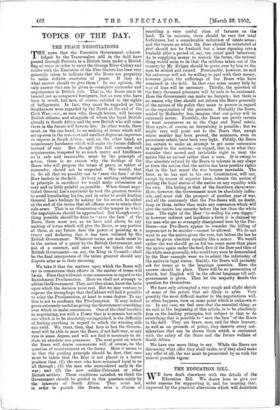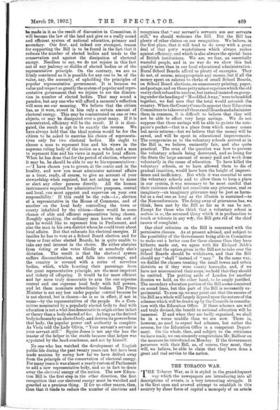THE EDUCATION W E have dealt elsewhere with the details of
the Education. Bill. We desire here to give our wider reasons ' for supporting it, and for trusting that, improved by the practical alterations which will doubtless be made in it as the result of discussion in Committee, it will become the law of the land and give us a really sound and efficient system of national education, primary and secondary. Our first, and indeed our strongest, reason for supporting the Bill is to be found in the fact that it reduces the number of elected bodies and tends to the conservation and against the dissipation of electoral energy. Needless to say, we do not rejoice in this fact out of any jealousy or dislike of elected bodies or of the representative principle. On the contrary, we are as firmly convinced as it is possible for any one to be of the value, nay, the necessity, of upholding the principles of popular representative government. It is because we value and respect so greatly the system of popular and repre- sentative government that we rejoice to see the diminu- tion in number of elected bodies. That may sound a paradox, but any one who will afford a moment's reflection will soon see our meaning. We believe that the citizen has, as it were, stored in him only a certain amount of electoral energy. This may be concentrated on one or two objects, or may be dissipated over a great many. If it is concentrated, efficiency will be the result. If it is dissi- pated, the result is apt to be exactly the reverse. We have always held that the ideal system would be for the citizen to be asked to exercise his choice of representa- tives only for two electoral bodies. He ought to choose a man to represent him and his views in the supreme ruling body of the nation as a whole, and a man to represent him and his views in regard to local affairs. When he has done that for the period of election, whatever it may be, he should be able to say to his representatives : I have chosen you to govern at the centre and in the locality, and now you must administer national affairs as a trust, ready, of course, to give an account of your stewardship when required, but not asking me to name or elect any other persons directly. All the human instruments required. for administrative purposes, central and local, you must appoint and supervise on your own responsibility.' If this could be the rule—i.e., election of a representative in the House of Commons, and of another on the local body controlling the town or county inhabited by the citizen—there would be some chan.ce of able and efficient representives 'being chosen. Roughly speaking, the ordinary man knows the sort of man he would like to represent him in Parliament, and also the man in his own district whom he could trust about local affairs. But that exhausts his electoral energies. If besides he has to vote at a School Board election and for three or four other elected Boards, he is quite unable to take any real interest in the choice. He either abstains from voting or else votes blindly at somebody else's dictation. The result is that the electoral system suffers disconsideration, and falls into contempt, and the country is covered with a series of nerveless bodies, which, while boasting their parentage from the great representative principle, are the most impotent and rickety of offspring. It would be far more efficient and far more truly democratic to arm the one supreme central and one supreme local body with full powers, and let them nominate subordinate bodies. The Prime Minister is not any less under popular control because he is not elected, but is chosen—he is so in effect, if not in name—by the representatives of the people. So a Com- mittee nominated by a popularly elected body to deal with education is not a whit less democratic in origin either infect or theory than a body elected ad hoc. As long as the derived body is chosen by an elected body, and derives its powers from that body, the popular power and authority is complete. As Viola told the Lady Olivia, " Your servant's servant is your servant still." Squire Jones is not any the less the master of the helper in the stable because that helper was appointed by the head-coachman, and not by himself.
No one who has watched the development of English public life during the past twenty years can but have been made anxious by seeing how far we have drifted away from the principle of the conservation of electoral energy. For many years it was almost a yearly custom of Parliament to add a new representative body, and so in fact to drain away the electoral energy of the nation. The new Educa- tion Bill is the first step in the other direction, the first recognition that our electoral energy must be watched and guarded as a precious thing. If for no other reason, then, than that it tends to reduce the number of elections and recognises that " our servant's servants are our servants still," we should welcome the Bill. But the Bill has plenty of other claims on our recognition. We believe, in the first place, that it will tend to do away with a great deal of that petty wastefulness which always makes against efficiency, and which is also always the special bane of British institutions. We are, we fear, an essentially wasteful people, and in no way do we show this bad quality more than in our local educational administration. Rural School Boards afford us plenty of examples. They do not, of course, misappropriate any money, but if all the money spent on salaries to clerks of small School Boards, on School Board elections, on unnecessary printing, paper, and postage, and on those petty minor expenses which the old vestry clerk refused to analyse, but instead insisted on group- ing under the heading of " Mooddled Away," were to be added together, we feel sure that the total would astonish the country. When the County Councils appoint their Education Committees to take over all these small Boards and administer them in common, it is difficult to believe that they will not be able to effect very large savings. We do not suppose that those savings will be able to go into the rate- payer's pocket—that is a place from which money comes but never returns—but we believe that the money will be saved, and will be spent in educational improvements. The compromise as to the voluntary schools arrived at in the Bill is, we believe, eminently fair, and also quite practical. The crux of the question was how to prevent the voluntary schools being destroyed, and so losing for the State the large amount of money paid and work done voluntarily in the cause of education. To have killed the voluntary schools, or to have allowed them to die of gradual inanition, would have been the height of improvi- dence and inefficiency. But while it was essential to save the voluntary schools and to allow them to keep a place in our system, it was necessary to be most careful that their existence should not constitute any grievance, real or imaginary—in imaginary grievance may be just as harm- ful as a real one as long as the illusion is sustained—to the Nonconformists. The doing away of grievances has, we think; been met by the Bill as far as it can be met. Except for those who think that a voluntary school is Indium, in se, the accursed thing which it is profanation to touch or tolerate in any wdy, the Bill gets rid of the chief causes of complaint.
Our chief criticism on the Bill is concerned with the permissive clauses. As at present advised, and subject to the possibility of the Government being able in Committee to make out a better case for these clauses than they have hitherto made out, we agree with Sir Richard Jebb's appeal that the option given in the Bill not to take over the School Boards should be withdrawn, and that the Bill should say " shall " instead of " may." In the same way, we dislike the clauses treating the small towns and urban districts as if they were county boroughs, and, if we have not misconceived their scope, we hold that they should be omitted. The putting aside of London for another Session we hold, on the other hand, to be amply justified. The secondary education portion of the Bill seems conceived on sound lines, but this part of the Bill is necessarily ex- perimental. To sum up, we may point out that the success of the Bill as a whole will largely depend upon the nature of the schemes which will be drawn up by the Councils in consulta- tion with the Education Office. If these schemes are well and truly devised, the benefit to national education will be immense. If and when they are badly organised, we shall be in a worse muddle than we are now. There is, however, no need to expect bad schemes, but rather the reverse, for the Education Office is a competent Depart- ment. On the whole, then, and subject to the criticisms we have made, we can sincerely congratulate Mr. Balfour on the measure he introduced on Monday. If the Government persevere with their Bill, as, of course, they must, they will, we believe, be able to claim that they have done a great and real service to the nation.







































 Previous page
Previous page